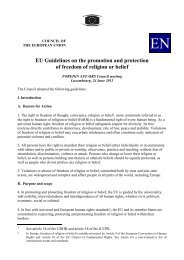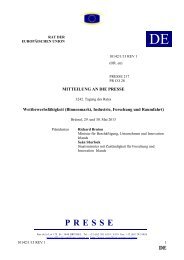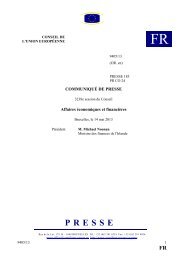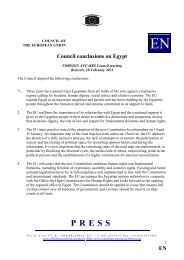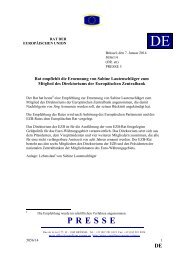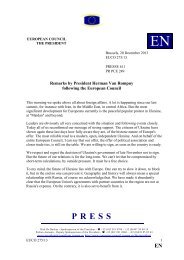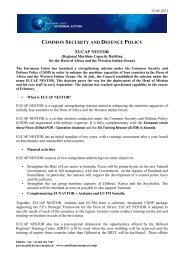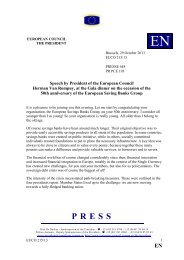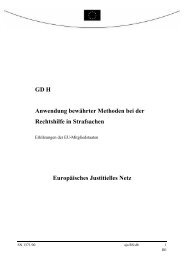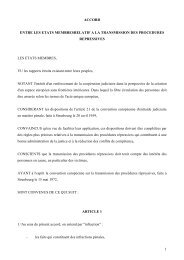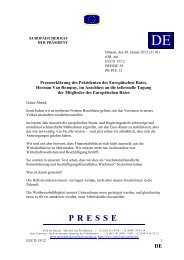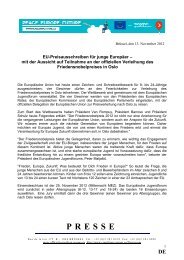14508/09 ADD 1 PL/vk 1 DG G COUNCIL OF THE ... - Europa
14508/09 ADD 1 PL/vk 1 DG G COUNCIL OF THE ... - Europa
14508/09 ADD 1 PL/vk 1 DG G COUNCIL OF THE ... - Europa
You also want an ePaper? Increase the reach of your titles
YUMPU automatically turns print PDFs into web optimized ePapers that Google loves.
It is clear from the MS' reports to the UNECE that many countries are very concerned with and try<br />
to take measures against trafficking for sexual purposes. Yet, the Belgian report is the only one<br />
which explicitly connects the problem of trafficking in women with the strategic objective of<br />
women and armed conflict and points to the work done in Belgium specifically related to Congo.<br />
Belgium has taken specific action, promoted the adoption of complementary resolution 1820 (2008)<br />
in the UN Security Council and set up a group within the UN Security Council of countries,<br />
UNIFEM and some NGOs. Germany supported the drafting of the report on Resolution 1820 by<br />
providing funding. What is relevant to the issue of trafficking is the behaviour of the staff of<br />
international missions. According to the French Presidency’s report, three MS (ES, NL, SE) refer<br />
explicitly to the use of codes of conduct for international missions. Codes of conduct regulate the<br />
behaviour of peacekeepers; military and civilian personnel toward the local population, when they<br />
are deployed in third countries. Some forbid any type of sexual relationship with the local<br />
population. In the French report 15 MS say they “carry out actions to prevent sexual abuse and the<br />
use of prostitutes and trafficking in women and children for male staff in police, humanitarian and<br />
diplomatic services”. Except for Belgium and Germany, the MS make no reference to this in their<br />
reports to the UNECE on the Beijing strategic objectives.<br />
There is no shortage of international commitments in the area of women and armed conflict. Apart<br />
from the Beijing strategic objectives, gender-based violence is considered a violation of<br />
fundamental human rights, in the Geneva conventions regulating warfare, women are protected<br />
against rape, forced prostitution and other gender-based violence. Furthermore, the CEDAW<br />
convention, the Statute of the International Criminal Court, UN Security Council resolutions 1325<br />
and 1820 all deal with related issues and objectives. While an international system of norms has<br />
been developed that suggests strategies and sanctions in this field, implementation continues to be<br />
weak. UN Security Council resolution 1325 (2000) is the international norm that reflects most<br />
comprehensively Beijing Platform for Action strategic objectives in this area and resolution 1820<br />
(2008) particularly reinforces the commitment to take action against sexual violence against women<br />
during armed conflict. These two resolutions closely correspond to some PfA strategic objectives.<br />
The French Presidency’s report discusses actions taken in the MS in response to UN SCR 1325.<br />
<strong>14508</strong>/<strong>09</strong> <strong>ADD</strong> 1 <strong>PL</strong>/<strong>vk</strong> 82<br />
ANNEX <strong>DG</strong> G EN



